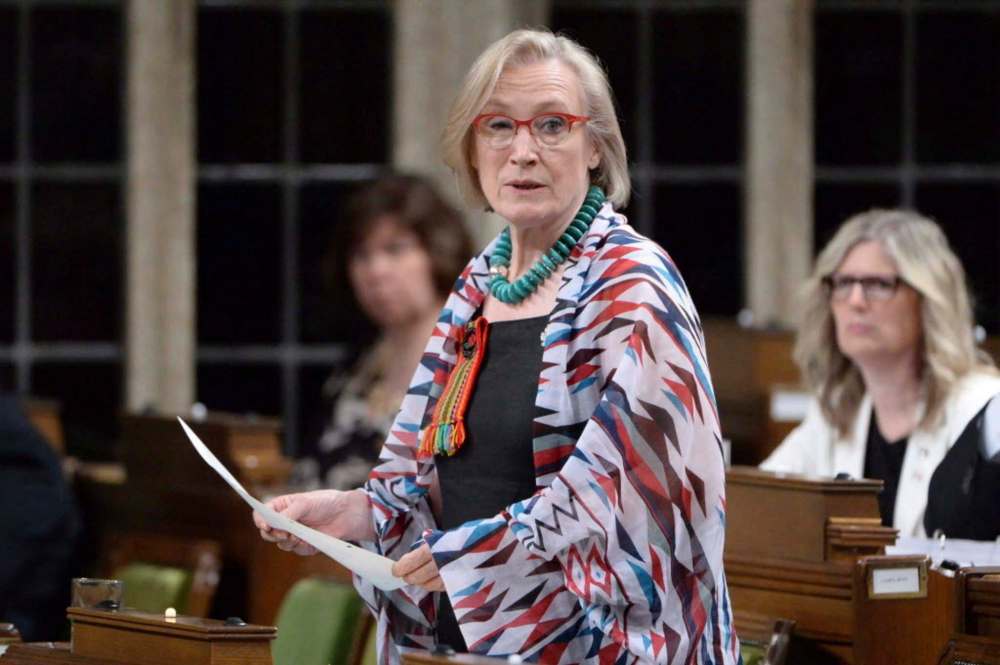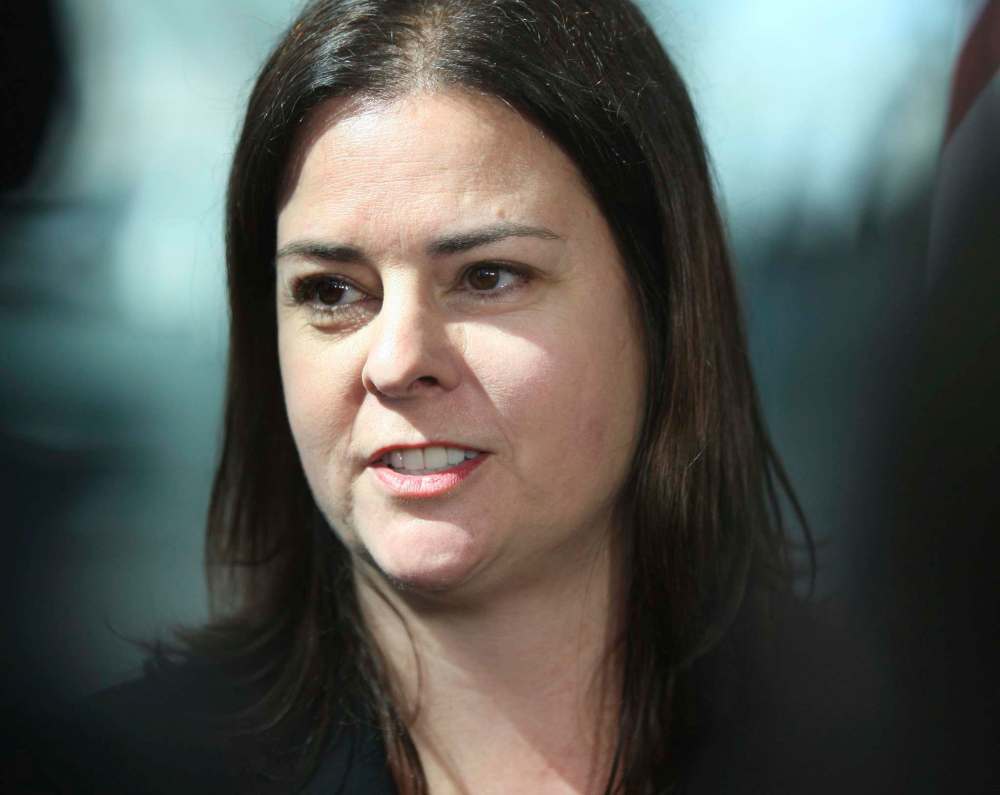Indigenous Affairs Minister reveals mandate of long-awaited MMIW inquiry
Advertisement
Read this article for free:
or
Already have an account? Log in here »
To continue reading, please subscribe:
Monthly Digital Subscription
$1 per week for 24 weeks*
- Enjoy unlimited reading on winnipegfreepress.com
- Read the E-Edition, our digital replica newspaper
- Access News Break, our award-winning app
- Play interactive puzzles
*Billed as $4.00 plus GST every four weeks. After 24 weeks, price increases to the regular rate of $19.95 plus GST every four weeks. Offer available to new and qualified returning subscribers only. Cancel any time.
Monthly Digital Subscription
$4.99/week*
- Enjoy unlimited reading on winnipegfreepress.com
- Read the E-Edition, our digital replica newspaper
- Access News Break, our award-winning app
- Play interactive puzzles
*Billed as $19.95 plus GST every four weeks. Cancel any time.
To continue reading, please subscribe:
Add Free Press access to your Brandon Sun subscription for only an additional
$1 for the first 4 weeks*
*Your next subscription payment will increase by $1.00 and you will be charged $16.99 plus GST for four weeks. After four weeks, your payment will increase to $23.99 plus GST every four weeks.
Read unlimited articles for free today:
or
Already have an account? Log in here »
Hey there, time traveller!
This article was published 03/08/2016 (3498 days ago), so information in it may no longer be current.
GATINEAU, Que. – A national inquiry looking at the high rate of violence against indigenous women and girls in Canada will begin Sept. 1 with a mandate to study the underlying causes and systemic issues that contribute to the problem, including police conduct and the role of the child-welfare system.
Indigenous Affairs Minister Carolyn Bennett unveiled the details of the national inquiry Wednesday morning surrounded by totem poles and long houses in a ceremony in the grand hall of the Canadian Museum of History.
“For me, personally, this journey began over a decade ago when I first met with many of the families who are here with us today,” she said. “Their stories about their mothers, daughters, aunties and cousins who tragically had gone missing or were murdered were heartbreaking. It’s because of these courageous women and families who knew something was very wrong that we are here today.”

Bennett named Manitoba teenagers Tina Fontaine and Rinelle Harper among the names Canadians have come to know as representatives of “a pattern of vulnerability and injustice that has to stop.”
Fontaine was 15 when she was murdered in Winnipeg in August 2014. Harper was 16 when she was sexually assaulted and left for dead on a Winnipeg riverbank in November 2014. They are but two of thousands of indigenous women and girls who have been murdered, gone missing or have suffered violence in Canada. The rate of violence against indigenous women is more than three times that faced by non-indigenous women.
Bennett said this inquiry will be the first in Canada to have buy-in from all 10 provinces and three territories. Each will pass an order-in-council to allow the commission to operate in their jurisdictions, which will give it room to call witnesses and compel the production of records from public institutions across the country.
Support from Manitoba
Manitoba had been accused of dragging its heels to support the inquiry but Justice Minister Heather Stefanson said Wednesday the delay allowed the government to consult with aboriginal leaders in the province.
“We heard loud and clear they wanted us to move forward,” she told reporters at the legislature.
The government is now drafting the order-in-council to adopt the terms of reference in Manitoba. Stefanson also expressed disappointment there was nobody from Manitoba among the five commissioners, and said the federal government never asked the province for any names.
The commissioners were selected from hundreds of names submitted to the federal government during the pre-inquiry process, and were chosen to be representative of the regions of Canada and to be linguistically and culturally diverse.
Stefanson was and still is concerned the inquiry not redo work already done in Manitoba in other inquiries, such as the inquiry looking at the death of five-year-old Phoenix Sinclair. The mandate of the inquiry specifically says it is to consider any relevant reports and investigations it wants. The Sinclair report, and the Aboriginal Justice Inquiry were not among the eight specific reports referenced for the commission to look at but there is nothing stopping the commissioners from looking at them.
Ottawa has set aside $53.8 million to pay for the inquiry, more than the $40 million listed in the recent federal budget. The inquiry will run through Dec. 31, 2018. The commission was given latitude to decide on its own how it will proceed, including the kind of hearings to be held and where and when they will be.
Informal processes
The inquiry is unlikely to include many typical courtroom-style hearings featuring a parade of witnesses; during consultations, most families told the government that is not what they wanted. Instead, more informal processes, including statement-taking — as was done during the Truth and Reconciliation Commission hearings — is likely. The inquiry is also to ensure it reaches all the regions in Canada.
“No one asked for a sterile courtroom drama where people will be asked to testify,” Bennett said at a press conference following the ceremony.
The inquiry commission will be headed by Marion Buller, the first female indigenous judge in British Columbia. Buller was the commission counsel during the Caribou-Chilcotin Justice Inquiry in B.C., which looked at the poor relations between First Nations people in the Caribou-Chilcotin region and all levels of the justice system.
Other commissioners include Michele Audette, the former head of the Native Women’s Association of Canada and onetime Liberal candidate, Ottawa lawyer Qajaq Robinson, University of Saskatchewan law professor Marilyn Poitras and Brian Eyolfson, a First Nations lawyer from Ontario.
The inquiry will not find criminal or civil wrongdoing, but if it reveals any instances of alleged misconduct that commissioners feel should be investigated, the information will be forwarded to the appropriate investigative bodies. Commissioners cannot compel police to re-open old cases deemed accidents or suicides in which family members firmly believe criminal wrongdoing was involved.
‘Really surreal that this day has actually come’
Bernadette Smith, whose sister Claudette Osborne-Tyo has been missing since 2008, is among those concerned that there isn’t a push to re-examine cases such as her sister’s. Osborne-Tyo says police didn’t take the case seriously for 10 days, allowing valuable evidence, such as security tapes, to be lost.

Manitoba NDP MLA Nahanni Fontaine, who has been an advocate for families of murdered and missing women for years, said she understands that disappointment. She watched the ceremony on the web Wednesday with the brother of a woman who has been missing for almost six years.
“He can’t see how the national inquiry will actually help him,” said Fontaine. “And that’s OK.”
Fontaine said it is not within the scope of a national inquiry to investigate specific cases, particularly open cases where releasing criminal investigation files to the public is not possible. She said an inquiry will never satisfy all families, who are all at different stages of their grief and experience but she believes the inquiry is a great step.
“As I watched everything live, it was, in some respects, really surreal that this day has actually come,” she told the Free Press, adding Manitoba has been “ground zero” for the 30-year campaign to force national action on MMIW.
“It’s going to be a long journey and a difficult journey but I’m hoping it will make us better Canadians.”
The mandate for the inquiry was developed over the last seven months in 18 pre-inquiry design meetings with more than 2,100 participants, including many family members of the murdered and missing. Another 4,100 online submissions were made.
Algonquin elder Claudette Commanda welcomed the launch event, calling the high rate of violence indigenous women and girls face a “national tragedy and disgrace.”
She said she hopes the inquiry will “ensure our women and our girls will no longer go missing or murdered and our men and our boys that they, too, can live in a society called Canada in peace and friendship and safety.”
The federal government is immediately launching family information liaison units in each province with $16 million. The units will serve as an access point for families to seek information about their loved ones’ cases.
— with files from Nick Martin
mia.rabson@freepress.mb.ca
History
Updated on Wednesday, August 3, 2016 1:38 PM CDT: Updated.
Updated on Wednesday, August 3, 2016 3:43 PM CDT: Writethrough






